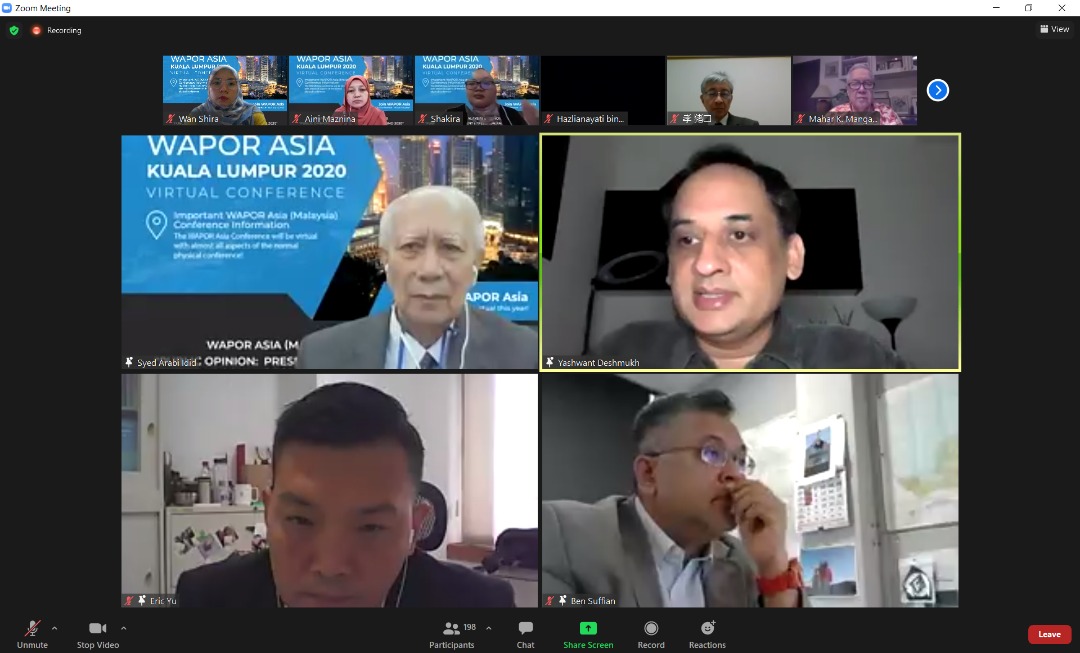By Iylia Marsya Iskandar
GOMBAK, 9 November 2020: The core of a democratic practice is the elections, thus public opinion research is crucial for the progress of a society and in understanding voters attitude and behaviour.
This view was shared by the President of World Association of Public Opinion Research (WAPOR) Asia and a member of Centre for Voting Opinions and Trends in Election Research (CVOTER International), Mr. Yashwant Deshmukh earlier this morning.
Mr. Yashmant along with Mr. Ben Suffian from Merdeka Centre, Malaysia and Dr. Eric Chen-hua Yu from the National Chengchi University, Taiwan shared their views in a panel discussion on “Public Opinion and Elections in Asia” in WAPOR Asia Kuala Lumpur 2020 Virtual Conference.
Panelists shared insights and researches based on their own respective countries.
Chaired by Prof. Dato’ Sri Dr. Syed Arabi Idid, the conference session ran for one and a half hours inclusive of a question and answer session from the audience.
According to all the three panelists, voters in the three countries namely in India, Malaysia and Taiwan shared a commonality as the voters harboured high political awareness.
In sharing his experience on public opinion research, Mr. Yashmant said, œEven though Bihar is arguably the poorest state in India but due to the historic nature of people and the republic form of government, their political consciousness is so high that locals on the street know more than a political expert as they have sheer interest in the process of politics.
Simultaneously, Mr. Yashmant pointed out that Malaysians have been expressing their opinion at polling stations especially in the 2018 general elections where the results favoured the opposition party.
œElection results tell us who wins the election but public opinion research is crucial to tell us exactly where, why and what went wrong for whom (who lost the election) and this is how we progress as a democratic society, Mr. Yashmant continued.
Meanwhile in Taiwan, Dr. Eric highlighted that political parties have been using polls through telephone and online surveys to determine their candidates for the upcoming elections.
Additionally, Dr. Eric stressed that polls are a major part of the policymaking process and electoral campaigns in the country.
The response rate was 50% in the past election through phone surveys. This shows that voters are waiting to exercise their right to choose, Dr. Eric added.
He said: œWith this, political parties delegate power to the general public to make the final decision and this is agreed upon by all contenders.
According to Mr. Ben, polls are also a mean to study public opinion in Malaysia but his team is facing some challenges in getting ordinary Malaysians views on politics.
He added: œThe critical problem faced in Malaysia is the high degree of non-response political item that limits the utility of surveys in predicting outcomes.
Mr. Ben shared several factors affecting this phenomena but it can mainly be attributed to the high conformist culture of Malaysians.
œMany respondents refuse to disclose their opinion if they have a non-conformist. For example, if a Malay is supporting a Chinese political party, they are shy to disclose and vice versa, Mr. Ben shared.
To overcome this challenge, Mr. Ben shared that Malaysian researchers resort to a different way of polling such as government approval ratings and this has proven to be an effective way of prediction.
In response to a question during the Question and Answer session on COVID-19 effects on voting behaviour, Mr. Yashwant believes that the pandemic will not dampen the spirit of voters.
This can be seen in the United States Presidential Election where there was a high voter turnout and voters can opt for postal, Mr. Yashwant pointed out.
Mr. Yashwant believes that œelections are the only thing that brought cheers in 2020 as the public can express their democratic rights and opinions and the results are inspiring.
WAPOR Asia Kuala Lumpur 2020 is the third annual conference organised by WAPOR and hosted by IIUM.
Under the theme œPublic Opinion: Present Reflection and Beyond 2020 WAPOR Asia Kuala Lumpur 2020 brought over 50 presenters from 16 different countries.
The session today was attended by scholars, lecturers and students from all around the world through the zoom platform. The conference will continue tomorrow. ***
